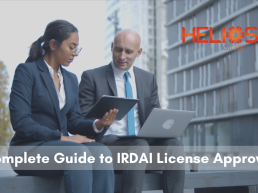How the New IRDAI Guidelines Are Shaping the Future of Insurance Brokers in India

India’s insurance broking industry is navigating through a major shift. The Insurance Regulatory and Development Authority of India (IRDAI) has issued new guidelines and regulatory changes that are redefining how brokers operate. These shifts are not just legal formality—they are pushing brokers to adapt, innovate, and become more customer-centric. Let’s see what’s changing and how brokers (and firms like HeliosGlobal) can respond.
What Are the Key New Guidelines?
Here are some of the recent IRDAI rules and changes that affect insurance brokers:
- Commission Flexibility & EOM Rules
IRDAI has removed strict caps on commissions for agents and brokers at the product level. Instead, insurers are expected to set board-approved overall ceilings on commissions under their Expenses of Management (EOM).
This gives insurers more flexibility to reward good brokers or intermediaries, while still maintaining oversight through cost management.
- Faster & More Transparent Claim Settlement & Mis-selling Controls
New master circulars require shorter claim‐settlement timelines. For example: life insurance death‐investigation claims must be settled faster than earlier, and health insurance authorisations (for cashless hospitalisation) must be handled quickly.
There are also stricter rules against mis-selling: better need analysis, clearer disclosures, bans on premium collection before policy acceptance, etc.
- Internal Ombudsman & Grievance Mechanisms
IRDAI is pushing for internal ombudsmen within insurers (and indirectly impacting how brokers handle complaints and disputes). The idea is faster resolution of grievances, fewer escalations to external forums, and more binding decisions in certain cases.
- Policyholder-Friendly Rules on Policy Discontinuance / Surrender Value
One change: when a policyholder stops paying premiums, the existing surrender value rules are being revised to ensure a fairer amount is paid back (paid-up sums, bonuses already attached).
- Regulatory Flexibility & Innovation
– Use-and-File product approval frameworks are being encouraged (as opposed to the older File-and-Use), speeding up how new insurance products come to the market.
– Regulatory sandbox and information maintenance / sharing regulations allow regulated entities to experiment (under oversight) and share data. This supports innovation.
How These Changes Affect Insurance Brokers
These new guidelines are shifting many levers for brokers. Here’s how:
- Incentives & Earnings Structure Change
With commission caps being relaxed (within EOM), brokers who perform well (good persistency, fewer claim disputes, high service quality) may get rewarded more. But they will need to demonstrate strong practices to benefit.
- Stronger Compliance & Disclosures
Brokers must improve transparency: clear terms to customers, disclosures of commission/rewards, following rules on premium collection only after policy acceptance. This raises operational overhead but builds trust.
- Faster Customer Service Expectations
Shorter claim timelines and stricter grievance handling mean brokers need systems (tech, trained people) to respond quickly. Delays, sloppy documentation, or unclear communication will hurt reputation.
- Product Innovation & Speed to Market
Brokers who partner with insurers launching new products faster (because of “use-and-file” or sandbox frameworks) can differentiate. They’ll have more variety to offer customers.
- Risk & Due Diligence
Mis-selling fines, rejected claims, customer complaints all carry more weight. Brokers must ensure proper need analysis, full disclosure, accurate policy wording, and ethical sales practices.
The Role of HeliosGlobal in this New Landscape
HeliosGlobal, being both a technology/consulting enabler and a broker/comparison intermediary, has a unique position to help brokers adapt. Here’s how:
- Advisory & Compliance Support: HeliosGlobal can help brokers interpret new guidelines, set up internal grievance handling, ensure their commission structures & disclosures meet IRDAI norms.
- Operational & Tech Tools: To meet faster claim timelines, digital tools for documentation, customer communication, tracking, dashboards etc., will be critical. HeliosGlobal can provide or advise on these.
- Training & Best Practices: Educating broker teams about new rules (when premiums can be collected, how need analysis must be done, fair surrender value etc.) is essential. HeliosGlobal can help with content, training protocols.
- Product Innovation Partnerships: Brokers who want to stay ahead can use HeliosGlobal’s network to access innovative insurers, sandboxed products, or newer policy designs, helping differentiate in competitive markets.
Challenges & Things to Watch Out For
- Implementing these rules (especially service timelines, disclosures, commissions) will involve cost—on tools, people, legal advisors.
- Inconsistency in enforcement across regions or among insurers may create mismatch in broker experience.
- Customer awareness: rules are only useful if customers know their rights (e.g., about premiums, surrender values, grievance redressal). Brokers may need to help educate clients.
- Intermediary competition: new distribution channels (corporate agents, IMFs etc.) may raise competitive pressure as brokers adjust.
Conclusion
The new IRDAI guidelines are pushing the insurance broking sector toward higher transparency, faster service, better ethics, and more innovation. The change isn’t optional—brokers who adapt will survive and grow; those who lag will face regulatory, market, or reputational risk.
If you’re a broker—or planning to be one—it’s a good time to audit your processes: commission structure, grievance mechanisms, disclosure norms, policy handling, documentation. With these changes, trust and speed become as important as products or reach.


